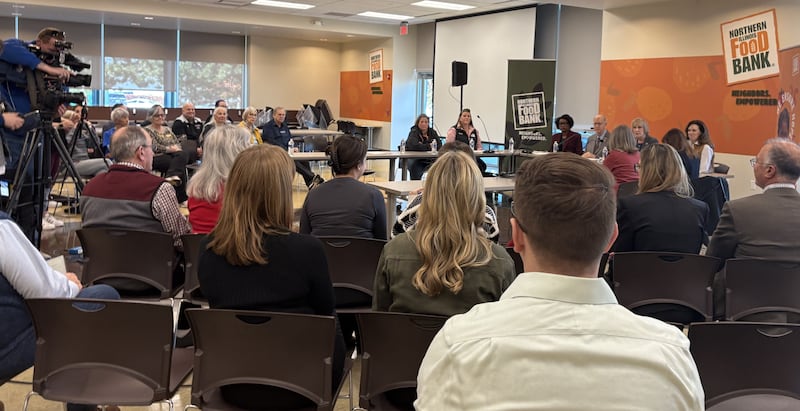Tina Ruiz isn’t sure how she will be able to pay bills and keep food on the table if Supplemental Nutrition Assistance Program benefits are not restored.
Ruiz, a Kane County resident, said she had received emails and letters about SNAP getting cut off and also saw it watching TV.
She said she Friday had not yet received November benefits – the same day the Supreme Court paused a lower court ruling ordering full funding of SNAP.
Ruiz has been going to food banks and pantries. She also has been exchanging food with her neighbors, who are all helping each other out. Ruiz said she knows some bills will be paid late this month and is “starting to feel the stress now” with the holidays coming.
Ruiz participated in a roundtable discussion Friday at Northern Illinois Food Bank in Geneva about SNAP cuts alongside U.S. Reps. Lauren Underwood and Bill Foster, state Sen. Linda Holmes, state Rep. Anna Moeller and Kane County Board Chair Corinne Pierog and food pantry and food bank officials.
:quality(70):focal(1151x389:1161x399)/cloudfront-us-east-1.images.arcpublishing.com/shawmedia/6K362WN46ZEFDBSB3ZYWIRO5YA.jpg)
Ruiz said lives with three relatives, including her disabled husband, and works part time as a caregiver for elderly residents and at a bus company. She gets about $294 in SNAP assistance per month, which she said makes a big difference.
She said she was grateful for the pantries and food banks but is hoping SNAP comes back soon.
“With the inflation and the rising costs of food, it’s still hard to make ends meet,” Ruiz said.
Pierog said 61,000 Kane County residents use SNAP.
Northern Illinois Food Bank President and CEO Julie Yurko said the food bank has a system to track activity at more than half of the food pantries it serves. From the first week in October to the first week in November, weekly visits increased from 63,000 to 80,000.
“It is devastating and it’s not OK,” Yurko said, adding the food bank will not be able to fill all the gaps resulting from SNAP cuts but is doing the best it can. She said for every meal the food bank provides, nine are typically provided through SNAP.
Eileen Pasero, executive director at the Batavia Interfaith Food Pantry, said it’s seeing twice as many families as in prior months and trying to increase the amount given to families to make sure they have enough.
Pasero said the community has stepped up: The pantry is fielding calls daily from groups interested in food drives and financial gifts, and volunteerism have increased.
She’s thankful for the donations but wishes it wasn’t the result of “these times of crisis when people really think and care” about neighbors.
Friday’s roundtable took place about a week after SNAP benefits lapsed because of the federal government shutdown. Later Friday, Supreme Court Justice Ketanji Brown Jackson temporarily halted an appeals court ruling that President Donald Trump’s administration had to restore full SNAP benefits. The Trump administration had asked the courts to block full payment during the shutdown.
During the roundtable, Underwood and Foster, both Democrats, denounced the SNAP cuts.
Foster said Trump politically is “doing the bare minimum to be able to claim that he is complying [with the courts] ... without actually providing the help that people depend on. And that’s the tragedy of the situation.”
:quality(70)/cloudfront-us-east-1.images.arcpublishing.com/shawmedia/E4LSHAVUWJBSHNJXD25FDDYZK4.jpg)
Foster said “there are real people that are going to be suffering if we don’t get this fixed.”
Underwood said it was a shared community value to make sure food banks and pantries and SNAP recipients have the resources they need.
“But since taking office, President Trump and MAGA extremists have repeatedly made it a priority to restrict food access for hungry families. The cruelty is literally their point,” Underwood said.
Republicans, however, have blamed Democrats for the government shutdown.
Holmes said the issue affects a lot of the state’s welfare, but much of the control and the ability to do anything is on the federal level, “which leaves us at the state level feeling incredibly helpless.”
Holmes nodded to Gov. JB Pritzker’s executive order Oct. 30 to allocate $20 million to support Illinois food banks and pantries. About 1.9 million Illinoisans depend on SNAP, many of them children, and the state oversees the distribution of $350 million in federal SNAP benefits each month, Capitol News Illinois reported.
“This is something that impacts our most vulnerable,” Holmes said.
Moeller, who chairs the Illinois House committee overseeing health and human services funding, said that cutting off SNAP is “unprecedented” and “unconscionable.”
